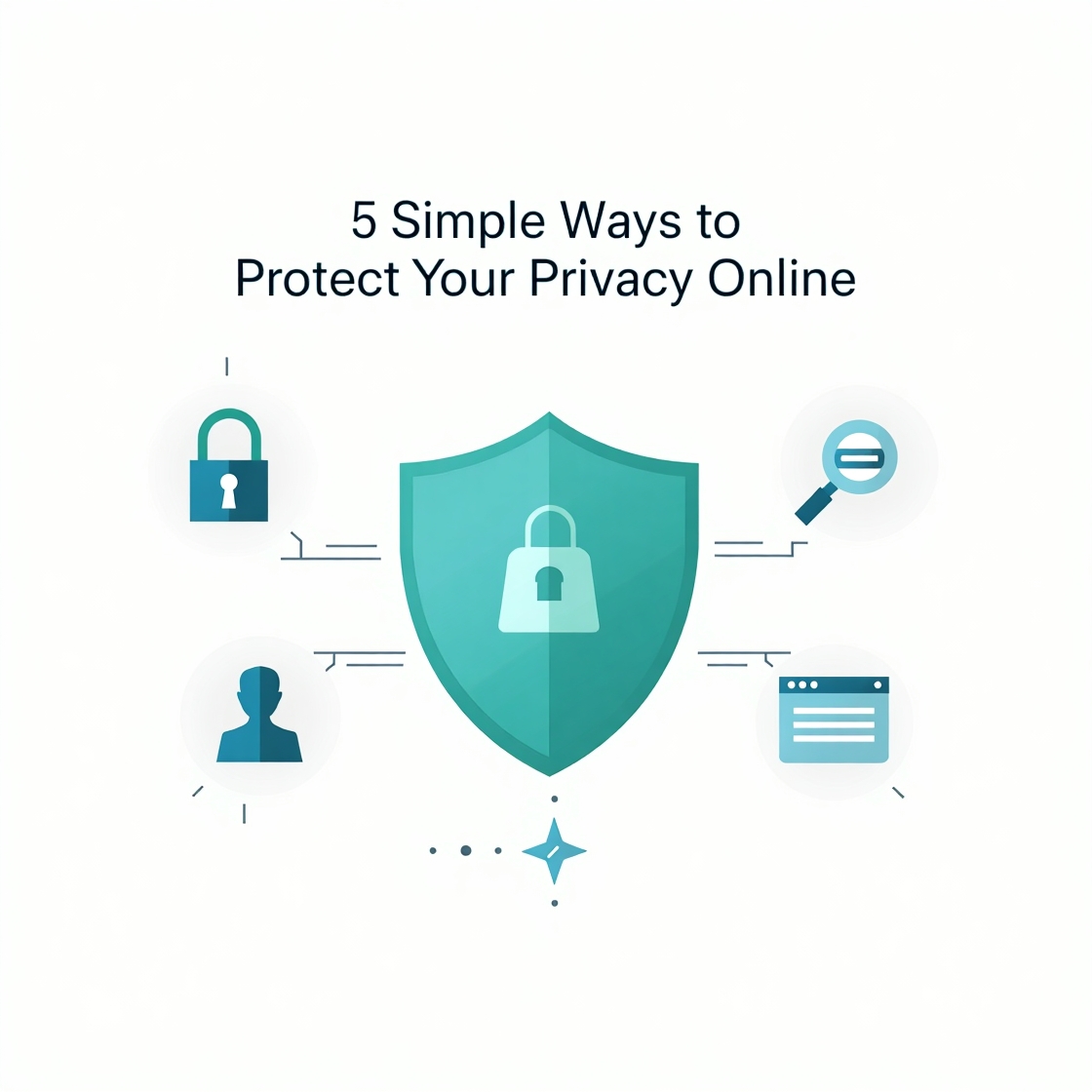5 Simple Ways to Protect Your Privacy Online
5 Simple Steps to Safeguard Your Privacy Online Keeping privacy online is becoming more important than ever.
You may not realize that websites, mobile apps, or hackers can monitor or steal aspects of your private information without you ever knowing. Do not worry, however!
Keeping your privacy safe is easier than you might think This article covers five relatively simple tips to help you stay safe, including how to enhance your privacy settings and make stronger password choices.
Why Online Privacy is Important
We give away a fair amount of personal information online today through social media, shopping, and browsing. Companies are using this data to direct their marketing towards you, whereas hackers may use it to exploit your information.
Protecting you online privacy isn’t just for the avoidance of identity theft; it’s about keeping control of your personal information.
The digital footprint you leave is more wide-reaching and affects more than you think. Employers look to your online profile; schools monitor their students; landlords may check your online presence. The more private your information remains, the more security you hold in how you are viewed by others. Privacy is a basic human right.
You should be able to browse and communicate without fearing you are being tracked. When you learn and appreciate why your online privacy is so important, you can begin to take simple steps towards feeling safer and more secure on the web.
Important of Strong, Unique Passwords
Employ Strong, Unique Passwords Using strong, unique passwords for your accounts is one of the simplest ways to protect your online privacy. A strong password generally includes upper and lower case letters, numbers, and special characters.
Avoid using readily available information, like your name, date of birth, or commonly known words. The better quality and more complicated your password is, the more difficult it is for cybercriminals to guess it through brute force attacks and other points of entry. In addition to using strong passwords, it is also important to have a unique password for each of your accounts.
If one of your passwords is compromised, having unique passwords helps keep the rest of your accounts secure from an unauthorized person obtaining access to them.
If you use the same password for accounts on different websites, if someone breaches one of those websites, that breach can lead to them compromising all of your other accounts. Using a strong, unique password manager can help you manage your passwords and generate easy to remember complex passwords without storing them verbatim. Creating strong passwords is an important step toward protecting your information, but then you must use them, and change them regularly to stay ahead of those looking to access your information.
Enable Two-Factor Authentication
Two-factor authentication (2FA) provides an extra layer of security to your online accounts by requiring a second form of verification in addition to your password, which is generally a code sent to your mobile device, email, or generated by an authentication app.
So, if someone gets their hands on your password, they would still need the second factor to get in, which makes it much harder for an unauthorized user to gain access.
Setting up 2FA is simple to do, and most major online services have added this features, including email providers, social media, and financial services.
When enabling 2FA, pick the type that is best for your needs, whether it is requesting a text message, using an app like Google Authenticator, or getting an email, each method has its own benefits; however, an app is normally considered secure than SMS, which is at risk of SIM swapping attacks. In addition to improved security, you may also feel better about online accounts.
It can alleviate concerns about being attacked, knowing your accounts are protected by an additional layer of security. No security protocol is perfect, but pairing strong, unique passwords with 2FA can significantly strengthen your defenses against cyber threats.
Beaver using Public Wifi
Be Careful Using Public Wi-FiPublic Wi-Fi networks (coffee shops, airports, hotels, etc.) are highly convenient but can be dangerous for your online privacy. These networks tend to be unsecured. It is easier for hackers to see what you are doing when that connection is unprotected. Once your device is connected to public Wi-Fi, malicious actors can see what you do online, including which websites you visit and what you type. This could lead to the compromise of personal and sensitive information (i.e., credentials, credit card numbers, etc.)
.To protect yourself when using public Wi-Fi, refrain from accessing sensitive accounts or banking. Instead, utilize your mobile data connection, which is more secure. If you need to use public Wi-Fi, consider using a Virtual Private Network (VPN) to cover your connection.
A VPN allows you to encrypt your connection and makes it tremendously harder for attackers to view what you were doing.
A VPN will create a secure tunnel from your device to the internet and will ensure your activities remain private.Another line of defense is by disabling your devices’ automatic Wi-Fi connection. Frequently, our smart phones and computers can be programmed to automatically connect to available Wi-Fi. This will place your device on potentially damaging networks.
Review Privacy Settings on Social Media
Social media platforms are a treasure trove of personal information, making them a prime target for cybercriminals and data miners. To protect your privacy, it’s essential to review and adjust your privacy settings on these platforms regularly. Most social media sites offer a range of privacy options that allow you to control who can see your posts, personal information, and activity. Taking the time to configure these settings can significantly enhance your online security.
Start by setting your profiles to private or friends-only, limiting access to your posts and personal information to people you trust. Review the visibility of your personal details, such as your phone number, email address, and location, and restrict them to only yourself or close friends. Be mindful of the information you share in your posts and consider the potential consequences of making certain details public.
In addition to adjusting your privacy settings, be cautious about accepting friend requests from people you don’t know. Fake profiles are often used to collect personal information or spread malware. Regularly review your list of friends and connections to ensure that you only share your information with trusted individuals. By taking these steps, you can minimize the risks associated with social media and protect your privacy online.
Be Mindful of the Information You Share
The information you share online can have a significant impact on your privacy and security. Even seemingly innocuous details can be used to build a profile of you, which can be exploited by cybercriminals, advertisers, and other entities. Being mindful of the information you share is a crucial aspect of protecting your online privacy. Think carefully before posting personal details such as your full name, address, phone number, or birthdate.
Consider the potential risks and consequences of sharing specific information. For example, posting about your location or travel plans can make you a target for burglars or stalkers. Sharing too much about your daily routine can provide valuable insights to those looking to exploit your habits. Even the photos you post can contain metadata that reveals your location and other sensitive details. Take the time to review the content you share and remove any information that could compromise your privacy.
It’s also important to be mindful of the information you share in private messages and emails. These communications can be intercepted or accessed by unauthorized parties, so avoid sharing sensitive information unless absolutely necessary. When possible, use encrypted messaging services to ensure that your communications remain private. By being cautious and deliberate about the information you share, you can protect your privacy and reduce the risk of exploitation.
The Role of Antivirus Software in Online Privacy
Antivirus software plays a crucial role in protecting your online privacy by detecting and preventing malware infections. Malware, such as viruses, spyware, and ransomware, can compromise your personal information and disrupt your online activities. By using reputable antivirus software, you can safeguard your devices against these threats and ensure that your data remains secure. Modern antivirus programs offer comprehensive protection, including real-time scanning, firewall protection, and anti-phishing features.
In addition to detecting and removing malware, antivirus software can also help protect your privacy by blocking malicious websites and downloads. Many cyber threats originate from compromised websites that deliver malware through drive-by downloads or phishing attacks. An effective antivirus program can identify these threats and prevent them from reaching your device. Regularly updating your antivirus software ensures that it can detect and neutralize the latest threats, providing you with ongoing protection.
While antivirus software is a critical component of online security, it should be used in conjunction with other privacy measures. No single tool can provide complete protection, so it’s important to implement a multi-layered approach to online privacy. This includes using strong passwords, enabling 2FA, being cautious with public Wi-Fi, and using a VPN. By combining these strategies with robust antivirus protection

